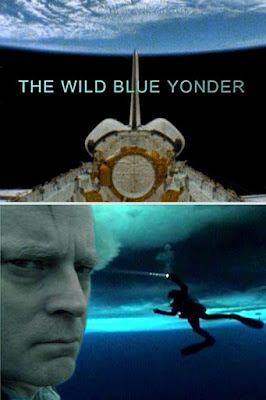Director: Werner Herzog
Screenplay: Werner Herzog
Cast: Brad Dourif as The Alien; Donald Williams as
the Astronaut Commander; Ellen Baker as the Astronaut physician (as Dr. Ellen Baker);
Franklin Chang-Diaz as the Astronaut Plasma Physicist; Shannon Lucid as the Astronaut
biochemist; Michael McCulley as the Astronaut pilot; Roger Diehl, Ted Sweetser
and Martin Lo as Mathematician
An Abstract List
Candidate
I hate to say this, but we aliens suck.
You can argue for many layers to Werner Herzog, the German director more known to some for his public persona even over his most well known work like Aguirre, The Wrath of God (1972). It can also be argued even who he is as a filmmaker is more complex because of his work in both fiction and documentary filmmaking. It cannot be separated because, making as many documentaries over the years as he has films, arguably more than over fictional work within the 2000s and 2010s, he was working in both mediums since the start of his career. Coming to The Wild Blue Yonder, we get something else entirely, a fictitious tale built around existing footage where Brad Dourif, a very underappreciated actor, plays an alien from the Andromeda Galaxy who has lived on Earth secretly for years, being our host and narrator.
His kind travelled from their dying world, the titular Wild Blue Yonder, and despite their best efforts to replace Washington D.C. with a new American capital with stores and an Andromeda museum, all Dourif has is a small town that looks abandoned behind him onscreen. He narrates how, having worked for CIA and been privy to the famous conspiracy of the Roswell UFO crash, how the human beings made an ill advised attempt to research the remaining wreckage of the ship. Spooked by nearly letting an alien bacterium infect the planet, they still plan ahead in case of any further incidents to search for another planet that can sustain human life, a group of astronauts searching in space.
Said tale is built from pre-existing footage. Astronauts from NASA are used, from the STS-34 space shuttle mission, whilst the Wild Blue Yonder itself, when reached by them, is our own ocean depths, the mysterious aquatic wildlife like jellyfish now strange and lonely creatures who like to communicate, only for the visitors to ignore them, and under ocean formations of ice or rock the architecture of a new world. That later footage, from a diving expedition in the Antarctica, was taken by Henry Kaiser, who is also a musician and has collaborated with Herzog a few times.
It is from Herzog a bit of an indulgent production as, even at around eighties minutes, it does risk taking its premise on for too long with only the astronaut footage in the middle half. Helping considerably is that, for the science, Herzog did get involved real academics to explain how the ideas the film talks of are in real life. This includes how long it would take just to get to the end of our galaxy with mathematical sums, or a theory which does sound like a deliberate fictitious one, but is an existing one, of the "gravity tunnels" which is the hypothesis that you could exploit the gravitational orbits to travel faster in space. Alongside Brad Dourif, this leads to the other prominent voice of the film, another MVP, being Franklin Chang-Diaz, whose theory of the gravitational tunnels (the secret allowing the spaceship to reach the Wild Blue Yonder) comes out abruptly as a sudden strange tangent. That and, sat next to a lemon tree outside, Herzog keeps a shot in of him sneezing.
The film definitely shows Herzog's auteurist voice, as whilst it is Brad Dourif who speaks the words as a narrator, they are definitely Herzog's sentiments. In two tangents one after another, he finds it a bad thing when we domesticated farm animals, pinning humanity down to locations whilst dogs could at least travel, and he definitely hates when human beings started climbing up mountains. Famously calling nature a personification of chaos, coming prominently in a film from the same year as this, the Timothy Treadwell documentary Grizzly Man (2005), Herzog has always respected it, and the best sequences of the film are when we finally set foot in the Yonder, the underwater footage of a striking world that does look frankly alien.
The film is also ultimately, almost naively, an ode to the best in humanity as he has text at the end praising NASA. Herzog, famously known for throwing himself in insane circumstances and/or getting into rows with his frequent star Klaus Kinski, has however always mixed his cynicism of humanity with the best of us. It can seem frankly hypocritical as, undeniably, his criticisms through Dourif about exploring mountains are his own words whilst he has however admired explorers of the natural world, but I guess if you are stuck in modern civilisation, you can appreciate those willing to explore and be adventurous. It is notable that the older Herzog has softened over the decades. Or he has layers, suggesting his more provocative statements are part of a persona; whilst the real man did nearly lose his mind on Fitzcarraldo (1982), this is also a man who loves football and has made documentaries after varying between the pioneers in the Antarctica or the digital world, willing to offer actual blunt criticism but also open to ideas more than some people a quarter of his age. The Wild Blue Yonder is not a key film from him for me, but its context makes sense and was worth having.
Abstract Spectrum: Playful/Tranquil
Abstract Rating (High/Medium/Low/None): None



No comments:
Post a Comment